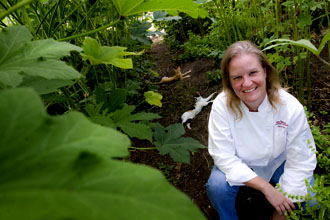Food Makes a Katrina Comeback
Claire Menck, a visiting scholar at the Newcomb College Institute, is taking inventory of the foods available from local neighborhood farms, markets and restaurants. She is in New Orleans to explore sustainability in the New Orleans food system following Hurricane Katrina.

Claire Menck, a visiting scholar at the Newcomb College Institute, checks out a neighborhood farm for her research examining the effects of Hurricane Katrina on the food system in New Orleans. (Photo by Paula Burch-Celentano)
Menck has been in the food service industry for 25 years. She earned the distinction of being named Restaurateur of the World in 1999. Shortly thereafter, the New England Culinary Institute, her culinary alma mater, asked Menck if she was interested in developing a program in sustainability in culinary arts.
"I had an MBA and they wanted someone to teach the economics of the food system," says Menck. "I started to develop the curriculum, and I realized that I really didn't have an answer for what a sustainable food system was, and nobody really had an answer."
She became a visiting scholar at the Newcomb College Institute in 2009, researching the effects of Hurricane Katrina on the food system.
"I became interested in, how does a place that takes food really seriously experience a really dramatic event like Katrina ⦠and what were the things in the food system that were and were not affected? And how does the community respond to that?" Menck says.
Another aspect of her study is a mapping component, comparing food availability prior to Katrina with the current situation. Menck says that there has always been less access to food in some neighborhoods, but the disparity is more evident now.
"There's not a whole lot in the lower 9th Ward or New Orleans East," said Menck. "What's the incentive to come back if there's no place to eat or go get groceries?"
However, following the storm there has been a greater emphasis on "civic agriculture" including farmers' markets. She says that local and regional food networks are one aspect of building more resilient and sustainable social systems, and fostering a vibrant, equitable social landscape.
Michael Celone is a sophomore student at Tulane majoring in public health.
